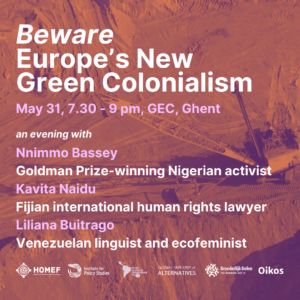Beware Europe’s New Green Colonialim

[English below]
NL – Aanstaande woensdagavond, 31 mei: een ontmoeting met 3 activisten/academici uit het Globale Zuiden die in België zijn om te benadrukken dat de klimaattransitie rechtvaardig en solidair moet zijn en dat de huidige koers zal leiden tot een ‘nieuw groen kolonialisme’ dat vooral het Globale Zuiden zal treffen.
Dit evenement gaat door in het Engels.
De plaatsen zijn beperkt, registreer hier!
_________________
EN – This Wednesday evening, May 31: a meeting with 3 activists/academics from the Global South who are in Belgium to emphasize that the climate transition must be just and solidarity-based and that the current course will lead to a “new green colonialism” that will mainly affect the Global South.
This event will be held in English.
Limited places, register here!
_________________
More information:
An evening with a delegation of Global South scholars and activists. They will speak about Europe’s Green colonialism and its severe consequences for the Global South.
Europe is leading the world in cutting carbon emissions. By 2020, the European Union had reduced emissions by an estimated 34 percent over 1990 levels, which puts its promised 55 percent reduction by 2030 safely within reach. But this European success story comes with a big asterisk. The European Union has made these cuts largely thanks to the Global South. Make no mistake: it’s not an equal partnership. A new “Green colonialism” dominates north-south relations, and it comes in two principal forms.
Many of Europe’s most carbon-intensive industries have relocated outside the EU, while still supplying products to European consumers. This “emissions outsourcing” has allowed European countries to appear virtuous, even as they simply move emissions around in a global shell game.
The EU has also been able to cut emissions by shifting to clean energy technologies like wind and solar. But these renewable sources require critical minerals—many of which come from the Global South. A great deal of the lithium for lithium-ion batteries is dug up in Argentina, Bolivia and Chile while much of the cobalt in the magnets used for wind turbines is extracted in Congo. At the same time, the rush for balsa wood, used for the construction of wind turbine blades, is having terrible consequences for the Ecuadorian Amazon and the indigenous communities that inhabit it. Additionally, some of the dirtiest processing of these minerals takes place in the Global South, like the world’s largest single rare earth element refinery in Malaysia.
Because of these forms of Green colonialism, Europe’s carbon footprint is far greater than its stated emissions. And right now, the European Union is discussing several “clean energy” policies” without sufficiently acknowledging this Green colonialism.
Schrijf je in voor dit evenement
Door op verzenden te klikken gaat je akkoord met de verwerking van je persoonsgegevens door Oikos vzw, voor communicatie-en relatiebeheer. Meer info in ons privacybeleid.
